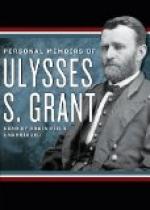The expedition finally got off on the 13th of December, and arrived at the place of rendezvous, off New Inlet, near Fort Fisher, on the evening of the 15th. Admiral Porter arrived on the evening of the 18th, having put in at Beaufort to get ammunition for the monitors. The sea becoming rough, making it difficult to land troops, and the supply of water and coal being about exhausted, the transport fleet put back to Beaufort to replenish; this, with the state of the weather, delayed the return to the place of rendezvous until the 24th. The powder-boat was exploded on the morning of the 24th, before the return of General Butler from Beaufort; but it would seem, from the notice taken of it in the Southern newspapers, that the enemy were never enlightened as to the object of the explosion until they were informed by the Northern press.
On the 25th a landing was effected without opposition, and a reconnoissance, under Brevet Brigadier-General Curtis, pushed up towards the fort. But before receiving a full report of the result of this reconnoissance, General Butler, in direct violation of the instructions given, ordered the re-embarkation of the troops and the return of the expedition. The re-embarkation was accomplished by the morning of the 27th.
On the return of the expedition officers and men among them Brevet Major-General (then Brevet Brigadier-General) N. M. Curtis, First-Lieutenant G. W. Ross, 117th Regiment New York Volunteers, First-Lieutenant William H. Walling, and Second-Lieutenant George Simpson, 142d New York Volunteers voluntarily reported to me that when recalled they were nearly into the fort, and, in their opinion, it could have been taken without much loss.
Soon after the return of the expedition, I received a dispatch from the Secretary of the Navy, and a letter from Admiral Porter, informing me that the fleet was still off Fort Fisher, and expressing the conviction that, under a proper leader, the place could be taken. The natural supposition with me was, that when the troops abandoned the expedition, the navy would do so also. Finding it had not, however, I answered on the 30th of December, advising Admiral Porter to hold on, and that I would send a force and make another attempt to take the place. This time I selected Brevet Major-General (now Major-General) A. H. Terry to command the expedition. The troops composing it consisted of the same that composed the former, with the addition of a small brigade, numbering about one thousand five hundred, and a small siege train. The latter it was never found necessary to land. I communicated direct to the commander of the expedition the following instructions:
“CITY POINT, VIRGINIA, January 3, 1865.
“GENERAL: The expedition intrusted to your command has been fitted out to renew the attempt to capture Fort Fisher, N. C., and Wilmington ultimately, if the fort falls. You will then proceed with as little delay as possible to the naval fleet lying off Cape Fear River, and report the arrival of yourself and command to Admiral D. D. Porter, commanding North Atlantic Blockading Squadron.




